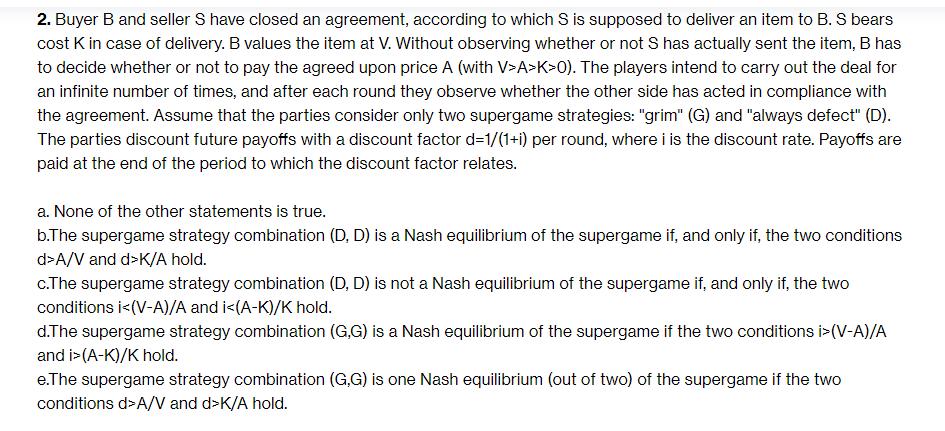Answered step by step
Verified Expert Solution
Question
1 Approved Answer
2. Buyer B and seller S have closed an agreement, according to which S is supposed to deliver an item to B. S bears

2. Buyer B and seller S have closed an agreement, according to which S is supposed to deliver an item to B. S bears cost K in case of delivery. B values the item at V. Without observing whether or not S has actually sent the item, B has to decide whether or not to pay the agreed upon price A (with V>A>K>0). The players intend to carry out the deal for an infinite number of times, and after each round they observe whether the other side has acted in compliance with the agreement. Assume that the parties consider only two supergame strategies: "grim" (G) and "always defect" (D). The parties discount future payoffs with a discount factor d=1/(1+i) per round, where i is the discount rate. Payoffs are paid at the end of the period to which the discount factor relates. a. None of the other statements is true. b.The supergame strategy combination (D, D) is a Nash equilibrium of the supergame if, and only if, the two conditions d>A/V and d>K/A hold. c.The supergame strategy combination (D, D) is not a Nash equilibrium of the supergame if, and only if, the two conditions i (A-K)/K hold. e.The supergame strategy combination (G,G) is one Nash equilibrium (out of two) of the supergame if the two conditions d>A/V and d>K/A hold.
Step by Step Solution
★★★★★
3.38 Rating (151 Votes )
There are 3 Steps involved in it
Step: 1
ANSWER a False The statement None of the other statements is true is not true as there are other statements that are true b True The supergame strateg...
Get Instant Access to Expert-Tailored Solutions
See step-by-step solutions with expert insights and AI powered tools for academic success
Step: 2

Step: 3

Ace Your Homework with AI
Get the answers you need in no time with our AI-driven, step-by-step assistance
Get Started


